- Home
- Michael Wallace
Wandering Star (The Quintana Trilogy Book 1) Page 6
Wandering Star (The Quintana Trilogy Book 1) Read online
Page 6
“Small. You can hide it on your person.”
“Call it two escudos and five.”
“Sounds reasonable,” Rafael said.
The two men slapped palms together, the whole deal done in ten seconds, and without consulting Iliana.
“I’m going in personally,” Iliana said. She gave her brother an irritated look and took back the lamp. “And I don’t appreciate you haggling on my behalf for things I don’t need or want.”
“Fine, do it your way.”
“If she needs to go in herself, she needs to go in herself,” the watchman said in a reasonable tone. “It’s nothing to me if she wants her throat cut to save a few coins.”
“It has nothing to do with saving coins. I’ve been ordered to go down personally.”
Yes, but why? Surely there was an easier way for Carbón to settle his guilt debt with the boy’s family than this. There must be some other reason he was sending her personally. Was it just to rid her of what her brother called naivete?
The more she stared down from the wall, the more her eyes adjusted to the dim light, and the ramshackle part of the city set in what were called the lower terraces came into clearer view. Not terraces so much as a patchwork of buildings tucked into nooks and clinging to the increasingly steep hillside that descended toward the Rift from the mountainous promontory. Anywhere the rock protruded, any place there was a small hollow, buildings clung to each other, pinned to the cliff face and connected by an impossible maze of rickety walkways and rope suspension bridges.
Hundreds of dark shapes flitted through the air. Giant, fruit-eating bats from the Rift. They mostly stayed lower, where the air was mild, but on hot summer nights, when the warm air masses overcame the cold winds from the plateau, the bats rose to feed in the gardens of the Forty and the Quinta. It was alarming when one swooped toward you with its six-foot wingspan, but she’d never heard of a bat attacking a human—they were entirely docile.
The wealthy of the upper terraces put out fruit and feeders to attract bats. The animals were said to contain the souls of the dead—the peaceful souls, not the vengeful lemures—who inhabited the bats for a spell before departing for their final rest. A visit brought luck and tranquility.
The people of the dumbre were more practical. They strung nets to snare them, hung lines with baited hooks, and sold bats in the markets alongside chickens and rabbits.
“I’ve been led to believe that there are other ways down,” Iliana said. “Secret ways, not so carefully watched.”
“Aye,” the watchman said. “Up yonder. Follow me.”
He stopped in front of one of the guard towers punctuating the wall. These towers were serious affairs, not the slender, elegant structures of the upper wall, but with gun slits and no windows on the lower level. A metal grate enclosed a doorway, fastened with a heavy wood and iron padlock.
“Sometimes the watch needs to send men down quietly,” the watchman said. “Go after the bad sort, the ones who have made trouble up above. Can’t be warning ’em ahead of time. The cabalists use this, too. They have their own keys.”
“Where does it lead?” Iliana asked.
“Drops you into a small alley. Dark, and it smells bad, but nobody will be down there waiting.”
Rafael sounded skeptical. “How can you be sure?”
“For one, you’d have to wait in that alley a long time ’fore anyone came down, and as often as not you’d find armed men to contend with. Second, you heard me say it smelled bad? There’s a pipe from the Quinta goes down there, and it leaks kind of bad.” He grinned, showing his chipped and missing teeth. “Shit always stinks, even when it comes from the exalted arses of the Quinta.”
Something stirred on the other side of the grate, a sound from within the tower, like a boot scraping on the stone.
The watchman turned sharply. “You hear that?”
“No,” Rafael said.
“I did,” Iliana said. “Is someone in there?”
The watchman took Iliana’s lamp and held it up to the grating. She peered in over his shoulder, and for a moment thought she saw something flatten itself against the spiraling staircase that formed the inner part of the watchtower. No, it was just shifting shadows.
“How could there be?” the watchman said. “The padlock is in place and locked.” He rattled it for emphasis.
For a second Iliana thought she’d caught a strange odor, too. It reminded her of cleaning out the coal stove, of the oily residue that caked the inside of the chamber.
Or the mines. You smelled it when you were looking at the boy, remember? Something rotten among the coal dust.
No, that was her imagination. Probably the lamp giving off a smell as it burned low. She should get more oil from the watch before returning with her brother to the upper terraces.
“Bet it was a rat,” Rafael said.
The watchman relaxed his posture. “Aye, I’ll wager you’re right. These towers are infested with the blighters. Can’t trap ’em fast enough, the way they breed in the lower terraces.” He eyed Iliana. “So that’s it. That’s how you get down to meet the dumbre without being spotted. What you do when you come out of that alley is another matter.”
She loosened the purse at her waist and fished out two silvers by touch and five of the larger, rougher brass pennies. “Here’s your two and five, and you don’t even have to make the delivery, only lend me the key.”
“Keys, not key. You’ll need another one to open the gate at the bottom of the tower.”
“Fine, give them both to me. I’ll return them when I’m done.”
The watchman licked his lips, but didn’t take the money. “When?”
“Tomorrow is the Festival of Fools. Let’s say the day after that. I’ll return the keys no later than midmorning on the first day of penance.”
The watchman looked to her brother, who shrugged as if to say he was washing his hands of the whole thing.
“The main gates will all be thrown open tomorrow anyway,” Iliana pressed. “Can’t see how you’ll need to get in here.”
“Can’t be caught without my keys, neither. I know this one is the captain and all, but I got my own commander to worry about. I’ll be flogged if I’m caught without ’em.”
“No, you won’t,” Rafael said. “Your commander told you to show us along the wall walk and answer our questions.”
“He didn’t tell me to hand over any gate keys.”
“I’ll vouch for you if you’re pressed,” Rafael said. “You won’t be blamed, I will.”
The watchman looked back and forth between Iliana and her brother. At last he handed her back the lamp and took the coins. A moment later, Iliana had a pair of large brass keys with long necks and curved teeth for tripping tumblers in old padlocks. She pocketed them.
#
A strange sensation followed her as she and Rafael climbed back up through the steep, narrow streets of the Thousand Terrace. She was anxious to get back to the familiar territory of the Forty, and thought at first it was only her worries pursuing her from the lower wall.
Her brother was chattering about nothing, telling her about a marriage Mother was pursuing for their youngest sister, Dalia. Rafael didn’t think much of Dalia’s chances, and offered that the girl would soon slip to the Thousand, if not farther.
“With her pox scars, she’ll be lucky to get a blacksmith or barrel maker,” he said. “But even then . . . It’s not like anyone taught the girl to cook or clean, and she doesn’t have a head for numbers like you do, either.”
Iliana was too wrapped up in her thoughts to respond, and Rafael trailed off and fell into an uncomfortable silence. A dog barked, furious and insistent, but not at them. A scrawny bitch with full dugs with the fur standing up on her back. There was nobody there, but the nearby gaslight flickered beneath its hood, as if a gust of wind had driven through. The dog’s shadow, bent into strange angles, cavorted on the wall.
Rafael took Iliana’s arm. “Come on, stop spooking ove
r every little noise. It’s a barking dog, not a lemure.”
Maybe so, but the strange sensation only grew until they were climbing the stairs to the Forty Terrace. There, among the stouter, better-lit homes, bathhouses, and market arcades, she finally felt secure. For the moment.
Tomorrow night, you go all the way down.
Chapter Seven
Quintana woke early, with a vibrating energy that rippled from the filthiest hovels of the dumbre, through the lower terraces to the Thousand and the Forty, and all the way to the palace-like mansions of the Quinta.
Even the roosters seemed to begin crowing early, and when the temple gong rang six bells, the notes had scarcely died before clumps of men in green robes with tall, pointed hoods took to the streets, banging pots with wooden spoons and marching up and down the alleys, chanting:
Wake, you fools! Dance with madness and pleasure and delight. Angels and kings shall sup with men, and men shall sit on thrones of gold. Today you are old and you are young, you are rich and poor. Today there is no heaven and no hell. Every woman is your wife, and every man your lover.
A few curmudgeonly sorts grumbled at the racket, wrapped themselves in their blankets, and covered their heads with pillows in a vain attempt to shut out the din. The rest tossed aside blankets and ran to throw open shutters. They were delighted to see the sun rising in a cloudless sky and to feel a warm breeze blowing up from the Rift. Fog still clung to the Great Span, but it would soon burn off.
In the Thousand, a beautiful young woman named Lila stepped onto her balcony overlooking the main market square and let slip her nightgown, until she stood naked. She began to sing, and was joined by jongleurs with mandolins, drums, and fifes all gathering below her balcony. Soon there were naked girls singing from balconies all around the plaza. Trumpets, gongs, singing, exploding strings of firecrackers—it all added to the general noise.
Women wheeled giant kettles into the plazas and heated them with braziers to make the traditional beef and white corn stew of Fool’s Day. Others steamed spongy buns wrapped in leaves or served morada, a hot drink of fermented purple corn. Children, running wild, drank the morada along with the adults when they needed something to wash down the honeyed rolls they stuffed in their mouths as fast as they came out of the communal ovens.
A few people—mostly foreigners—tried to pay for the food and drink materializing on the plaza and all the little squares throughout the city, but their coins were refused. Lady Mercado had paid for it all, and quite generously. Only keep the food and drink flowing, and it would all be covered.
The watch threw open the gates, and men and women came flowing up from the dumbre as the day wore on. They carried chickens and bats and hefted barrels of distilled black apple cider. The bittersweet black apples came from bushes that grew wild on the cliffs below the lower terraces, and were harvested every fall by enterprising young men lowered in rope harnesses, with the majority of all the cider consumed on this one day of the year.
But the cider wouldn’t be consumed until nightfall. By then, the city would be half-drunk already, and the strange properties of the black apple would make the imbibers feel as though they were floating from one party to the next, wings on their heels. A cup or two of black cider would leave one’s memories hazy and surreal, but that was half the appeal, as was the thumping hangover the next morning.
After all, tomorrow began three weeks of penance. You shouldn’t feel good when it started. You should feel miserable and regretful. You should very nearly hate yourself, and you should be suspicious of others.
But that was tomorrow. Today was a day for revelry, hedonism, and the destruction of social class. Today, Quintana was the City of Fools.
Chapter Eight
It was early evening when Carbón and Iliana queued in front of Lady Mercado’s gates. He felt quiet, determined, his thoughts troubled by yesterday’s events. Iliana had her own worries, he knew, and hadn’t spoken as they climbed the Quinta Terrace to arrive at Mercado’s estate up top.
Most of the people waiting to sample Mercado’s famous hospitality were already far gone, had most likely been drunk or worse since midday, but not everyone. Among the apparently sober, he spotted the Luminoso cabalist Salvatore up ahead, speaking with Daniel Torre and his wife, Naila Roja. Lord Torre, too, leaning on a mahogany cane, which was more promising, but only if Torre didn’t spend the evening with the cabalists.
“You seem entirely sober,” Iliana said as they inched forward.
“So do you.”
“I have somewhere to go later,” she said. “Need to keep my wits.”
“You’d probably attract less attention drunk.”
“That map you gave me is a maze, and it’s dark down there. Besides, I’m likely to stumble on a staircase and fall to my death. If you haven’t noticed, I’m not the most graceful person to ever set foot on Lady Mercado’s estate.”
“Which is amusing, since my only memory of you before you entered my employ was as a social creature. Don’t they still give young women dancing lessons in the Forty?”
“They do. Mine never took. I don’t think I wanted them to.” Iliana gave him a funny look. “A social creature? Why would you think that?”
“You’re young and pretty, and your mother has a reputation for matchmaking. I assumed you’d marry for status, then spend the rest of your life clinging to it and maneuvering on behalf of your children. I was obviously mistaken, but that was my first impression.”
Even in the flickering light of gas lamps, he could see her blushing. He hadn’t meant it as an insult, but only to point out how he’d underestimated her. She had clearly taken it wrong. He wanted to correct his words before she was offended, but worried about stumbling further.
The line inched forward. A pair of rockets shot out from somewhere on the Thousand Terrace and exploded in red and gold sunbursts over the Rift, momentarily illuminating the Great Span. A third rocket launched, but this one was a boomer—a flash of light and a crack that echoed like thunder up and down the ridge.
“Beautiful weather tonight,” came a smooth voice to one side.
It was Salvatore. The cabalist had filtered back from his advantaged position closer to the gates, or maybe he’d only stayed in position while the others flowed around him like a river swirling around a boulder.
Salvatore was about forty, slender and balding, with a goatee and a few stray pockmarks on his cheeks. His eyes were deep set behind high cheekbones, and there was something in the set of his mouth and his wandering eyes that looked perpetually scheming.
He swayed slightly, and a sloppy grin crossed his face. That was an act, Carbón was certain; Salvatore had seemed sober enough when speaking to Torre and his family.
Carbón swallowed his distaste and kept his tone warm. “Better than last year. That cold rain was ugly.”
“Lord Torre almost stayed in his quarters,” Salvatore said. “A little rain would have put him off entirely. What is holding up this line, anyway? I’m hungry.”
“He said that?”
“Not precisely, no.” Salvatore eyed Iliana. “Why, you look altogether sober, my dear. Saving your appetites, no doubt. We’ll be sure to indulge them tonight, eh, Carbón?”
Carbón stood shoulder to shoulder with his chancellor and felt her shudder, though no change appeared on her face. He doubted she had anything to worry about. Salvatore certainly wasn’t hoping to bed the young woman, he was only fishing for information, and would no doubt make a note somewhere that Iliana Diamante had arrived sober, and left that way, too. With any luck, she’d slip out while he wasn’t watching.
Lady Mercado’s booming voice called through the crowd. “Quickly, quickly! Let them in. Let them all in! The roast pigs are on the table, and the wine uncorked.”
Salvatore left Iliana and Carbón and picked his way forward, ignoring all the others who were waiting their turn. There was no class here, no status—not today there wasn’t—and so his line cutting might be taken as a m
inor impropriety, cabalist or no.
Carbón leaned in and told Iliana in a low voice, “Don’t worry, you’ll be long gone before Salvatore finishes eating and drinking long enough to seek out lovers. And I won’t bother you, either. You know that.”
“Oh, it’s no bother.” A sly smile. “You’re not my master tonight, Alan Carbón. Catch me before I leave, and I’ll show you what I mean.”
“Wait, you have been drinking.”
“A cup of black apple. You were taking forever getting ready, and a woman came by the gates with a barrel. I couldn’t resist.”
“You’re supposed to drink black apple after you’re already drunk. Otherwise, it makes you hallucinate.”
“Only the weak-minded,” she said. “I’ve done it before. The cider sharpens my senses. It’s dark in the lower terraces.”
“Ah.”
Now that he was paying closer attention, he noted that she’d dropped some of her clipped way of speaking. A tongue both figuratively and literally loosened. She’d better know what she was doing, or she’d get herself in trouble down there, Festival of Fools or not.
The line was flowing faster now that Mercado had taken over for whoever had been keeping the gate, and she was admitting guests at a rapid clip. Her arms were visible first, waving, gesturing, slapping people’s shoulders in a familiar way. Guests flowed around her, one after the other, and soon Carbón and Iliana were nearing the entrance to her estate.
Lady Mercado was a large, well-built woman, in her mid-fifties now, but still handsome. She’d tucked herself into a tight bodice, bosoms bulging, accomplishing with ribbing and cord what time and gravity had denied. Widowed now, with her wealth and presence, she could have bedded the old and young alike whether it was Fool’s Day or not.
But that was not Mercado’s way. She was a proper widow, claimed she had no desire to remarry, and would remain chaste until her death. Except for this one night a year, of course.
She made lewd comments to one and all as they passed. She kissed men and women, put her hands on the breasts of Lord Puerto’s wife, who had returned to the city for the festival, and cupped Lord Torre’s crotch as the old man approached.

 Crowlord (The Sword Saint Series Book 2)
Crowlord (The Sword Saint Series Book 2) Crowlord
Crowlord The Red Sword- The Complete Trilogy
The Red Sword- The Complete Trilogy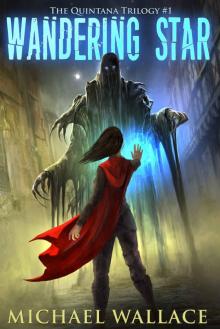 Wandering Star (The Quintana Trilogy Book 1)
Wandering Star (The Quintana Trilogy Book 1)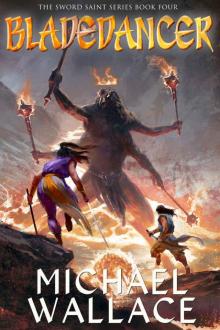 Bladedancer
Bladedancer Sword Saint
Sword Saint The Alliance Trilogy
The Alliance Trilogy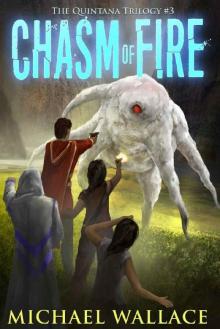 Chasm of Fire
Chasm of Fire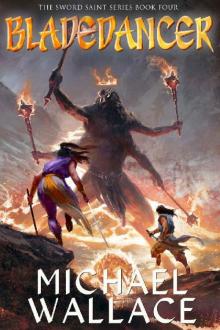 Bladedancer (The Sword Saint Series Book 4)
Bladedancer (The Sword Saint Series Book 4) The Devil's Deep
The Devil's Deep Shadow Walker (The Sword Saint Series Book 3)
Shadow Walker (The Sword Saint Series Book 3) Starship Blackbeard
Starship Blackbeard The McHenry Inheritance (Quill Gordon Mystery Book 1)
The McHenry Inheritance (Quill Gordon Mystery Book 1) Sun King (The Void Queen Trilogy Book 3)
Sun King (The Void Queen Trilogy Book 3) Blood of Vipers
Blood of Vipers Righteous - 01 - The Righteous
Righteous - 01 - The Righteous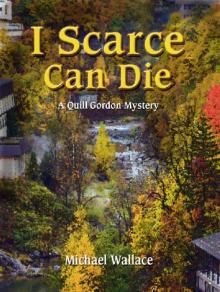 I Scarce Can Die (Quill Gordon Mystery Book 5)
I Scarce Can Die (Quill Gordon Mystery Book 5)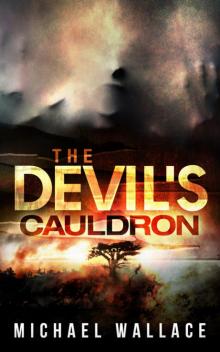 The Devil's Cauldron
The Devil's Cauldron The Wicked (The Righteous)
The Wicked (The Righteous) Crow Hollow
Crow Hollow Righteous03 - The Wicked
Righteous03 - The Wicked Righteous02 - Mighty and Strong
Righteous02 - Mighty and Strong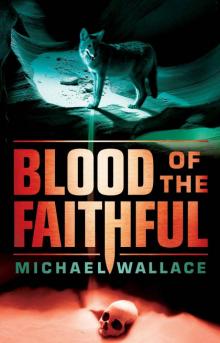 Blood of the Faithful
Blood of the Faithful Wash Her Guilt Away (Quill Gordon Mystery Book 2)
Wash Her Guilt Away (Quill Gordon Mystery Book 2) The Kingdom of the Bears
The Kingdom of the Bears The Emerald Crown (The Red Sword Trilogy Book 3)
The Emerald Crown (The Red Sword Trilogy Book 3) The Dark Citadel
The Dark Citadel The Warrior King (Book 4)
The Warrior King (Book 4) Rebellion of Stars (Starship Blackbeard Book 4)
Rebellion of Stars (Starship Blackbeard Book 4)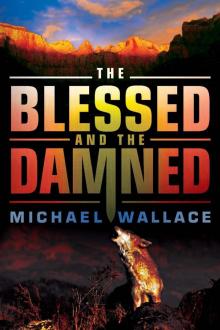 Righteous04 - The Blessed and the Damned
Righteous04 - The Blessed and the Damned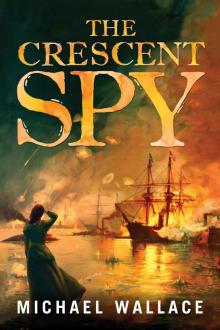 The Crescent Spy
The Crescent Spy Queen of the Void (The Void Queen Trilogy Book 1)
Queen of the Void (The Void Queen Trilogy Book 1)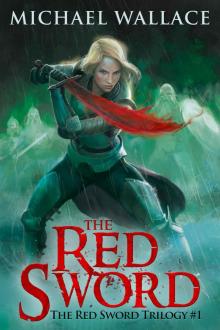 The Red Sword (The Red Sword Trilogy Book 1)
The Red Sword (The Red Sword Trilogy Book 1) The Sentinel (The Sentinel Trilogy Book 1)
The Sentinel (The Sentinel Trilogy Book 1)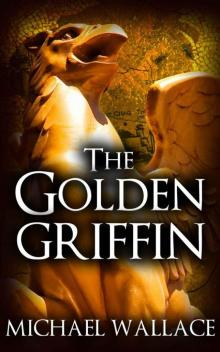 The Golden Griffin (Book 3)
The Golden Griffin (Book 3)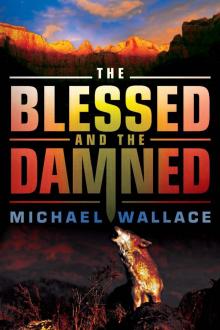 The Blessed and the Damned (Righteous Series #4)
The Blessed and the Damned (Righteous Series #4) Hell's Fortress
Hell's Fortress Not Death, But Love (Quill Gordon Mystery Book 3)
Not Death, But Love (Quill Gordon Mystery Book 3) Destroying Angel
Destroying Angel The Free Kingdoms (Book 2)
The Free Kingdoms (Book 2) Dragon Quadrant (The Sentinel Trilogy Book 2)
Dragon Quadrant (The Sentinel Trilogy Book 2) Shattered Sun (The Sentinel Trilogy Book 3)
Shattered Sun (The Sentinel Trilogy Book 3)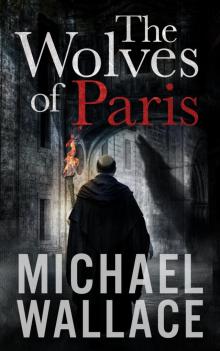 The Wolves of Paris
The Wolves of Paris Lords of Space (Starship Blackbeard Book 2)
Lords of Space (Starship Blackbeard Book 2) Dreadnought (Starship Blackbeard Book 3)
Dreadnought (Starship Blackbeard Book 3) The Village of Dead Souls: A Zombie Novel
The Village of Dead Souls: A Zombie Novel The Black Shield (The Red Sword Book 2)
The Black Shield (The Red Sword Book 2) The Daughters Of Alta Mira (Quill Gordon Mystery Book 4)
The Daughters Of Alta Mira (Quill Gordon Mystery Book 4) Mighty and Strong (The Righteous)
Mighty and Strong (The Righteous)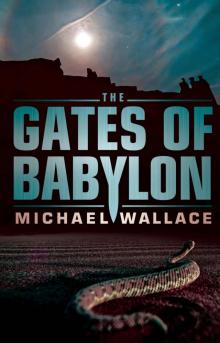 The Gates of Babylon
The Gates of Babylon